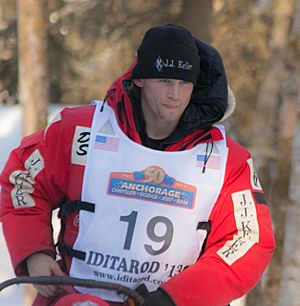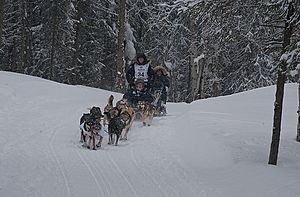Dallas Seavey facts for kids

Dallas Seavey in Anchorage, Alaska during the ceremonial start of the 2012 Iditarod Trail Sled Dog Race
|
|
| Personal information | |
|---|---|
| Nationality | American |
| Born | March 4, 1987 (age 38) Virginia |
| Sport | |
| Sport | Dogsled racing |
| Event(s) | Iditarod Trail Sled Dog Race
Yukon Quest Finnmarksløpet |
Dallas Seavey, born on March 4, 1987, is an amazing American dog musher. A dog musher is someone who drives a team of sled dogs. He is famous for winning the Iditarod Trail Sled Dog Race in Alaska a record six times! He won in 2012, 2014, 2015, 2016, 2021, and 2024. Dallas also won the Yukon Quest sled dog race in 2011. He even raced in Europe's longest sled dog race, the Finnmarksløpet in Norway, in 2018 and 2019.
Dallas comes from a family of mushers. His grandfather, Dan Seavey, raced in the very first Iditarod races in 1973 and 1974. Dallas's father, Mitch Seavey, is also a champion musher. Mitch won the Iditarod in 2004, 2013, and 2017.
Contents
Dallas Seavey's Iditarod Journey
Dallas Seavey made history when he became the youngest musher to ever compete in the Iditarod. He started his first race on March 5, 2005, just one day after his 18th birthday! Back then, he raced with a team of younger, less experienced dogs from his father's kennel.
Youngest Iditarod Champion
Dallas quickly showed his talent. By the 2009 Iditarod, he was already finishing in the top ten. In 2012, at just 25 years old, he became the youngest musher to win the Iditarod. His winning time was 9 days, 4 hours, 29 minutes, and 26 seconds.

Breaking Records and Winning More Races
In 2014, Dallas won his second Iditarod. It was a very close race! He finished less than two minutes ahead of the second-place musher, Aliy Zirkle. Dallas set a new record that year with a time of 8 days, 13 hours, 4 minutes, and 19 seconds. This was more than five hours faster than the previous record set by John Baker in 2011.
Dallas won the Iditarod for a third time in 2015. That year, the race had to start in Fairbanks instead of its usual spot because there wasn't enough snow in Southcentral Alaska.
In 2016, Dallas Seavey won his fourth Iditarod, and he broke his own record time! His new fastest time was 8 days, 11 hours, 20 minutes, and 16 seconds.
A Family Rivalry and a Short Break
In 2017, Dallas came in second place. His father, Mitch Seavey, won the race and even broke Dallas's record! Mitch's winning time was 8 days, 3 hours, 40 minutes, and 13 seconds.
After the 2017 race, there was a concern about some of Dallas's dogs. Dallas said he had no idea how it happened and thought someone might have tried to cause trouble for him. The Iditarod Trail Committee looked into it and cleared him. To make sure this kind of thing didn't happen again, the race added new rules. They started sealing dog food bags with special ties and watching dog lots and checkpoints 24/7. Dallas decided to take a three-year break from the Iditarod after this.
Returning to Victory
In 2021, Dallas Seavey returned to the Iditarod. He raced with a team that included some of his father's dogs, as Mitch Seavey decided not to race that year. Dallas won the slightly shorter 2021 Iditarod in 7 days, 14 hours, 8 minutes, and 57 seconds. This was his fifth championship, which tied him with Rick Swenson for the most Iditarod wins ever!
A Record-Breaking Sixth Win
During the 2024 Iditarod, Dallas Seavey had an unexpected encounter with a moose. The moose attacked him and his dogs, and one of his dogs was hurt. Dallas had to use a handgun to protect his team and kill the moose. He spent about 10 minutes at the site before continuing the race. Race officials gave him a two-hour time penalty for not preparing the moose properly after the incident. This penalty was added to his mandatory 24-hour rest stop. Even though he fell behind because of the penalty, Dallas Seavey pushed through and went on to win his record-setting sixth Iditarod!
Other Sled Dog Races
Yukon Quest Success
In 2011, Dallas Seavey won the 1,000-mile Yukon Quest race. This tough race goes between Whitehorse, Yukon, and Fairbanks, Alaska. He finished with an impressive time of 10 days, 11 hours, and 53 minutes.
Racing in Norway: Finnmarksløpet
Dallas Seavey also competed in Europe's longest sled dog race, the 1,200-kilometer Finnmarksløpet in Norway. In 2018, he placed third in this challenging event, which was his first time racing there. He started the race again in 2019 but had to stop early to make sure his dogs stayed healthy.
 | Anna J. Cooper |
 | Mary McLeod Bethune |
 | Lillie Mae Bradford |

